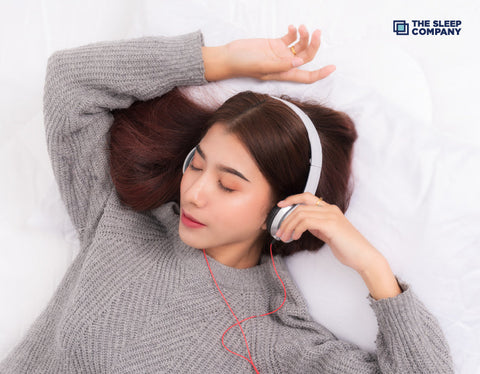My Cart

What Affects Our Sleep Patterns

Have you ever felt exhausted when your mind simply won't switch off? The clock keeps ticking, minutes turn to hours, and sleep keeps eluding you. But when you see your partner or perhaps a sibling fall asleep almost instantly, you end up feeling more frustrated.
But why does this happen? Our sleep patterns are to blame. They are more than just our bedtime. Instead, they are shaped by stress, our lifestyle choices, etc.
That said, understanding what prevents you from sliding into dreamland as soon as you close your eyes is the key to a good night's rest. So today, let's unpack what affects our sleep patterns and how you can rectify them.
Top 12 Things That Affect Our Sleep Patterns And How To Combat Each

Now, let’s see the common things that can affect sleep patterns and how you can overcome them.
1. Circadian Rhythm Disruptions
We are all blessed with an internal clock known as the circadian rhythm. This controls when we feel sleepy or alert. Basically, it takes care of our sleep-wake cycle. However, irregular sleep schedules, shift work, etc., can adversely affect the clock. It is one of the main reasons why we experience poor sleep quality.
How To Rectify It:
One of the easiest ways to rectify this is to maintain a consistent sleep schedule, whether it is the weekend or vacation. Also, make sure you get plenty of sunlight during the day and curb screen exposure at night. This is because our internal clock works on light and darkness. Finally, avoid naps longer than 20–30 minutes in the late afternoon to maintain a stable sleep-wake cycle.
2. Age and Sleep Changes
As we age, our sleep patterns tend to shift. Infact, older adults tend to wake up earlier and experience lighter sleep. This can be because of hormonal changes, medical conditions, and reduced melatonin production. If you have been experiencing fragmented sleep, it is important to take a deeper look and understand the root cause.
How To Rectify It:
A few things you can try to help you out are;
- Create a relaxing bedtime routine
- Avoid heavy meals before bed
- Limit alcohol and caffeine intake in the evening
- Ensure your bedroom is comfortable
If nothing works, don't hesitate to speak with your doctor. They will be able to guide you in the right direction.
3. Genetic Sleep Patterns
We all have a preference, don't we? Some of us enjoy being night owls while others prefer being early risers. Well, this is because of our genetic predisposition. Here, making certain sleep choices can be helpful but deeply ingrained sleep tendencies can be challenging to change.
How To Rectify It:
The best way forward is to work with your natural sleep preference, at least when possible. But if your lifestyle needs you to shift your sleep schedule, make gradual adjustments. Start with 15–30 minutes per night. Also, another trick is to expose yourself to natural sunlight to help you wake up early as it influences our circadian rhythm.
4. Screen Time Exposure
We are usually glued to our phones and laptops, or perhaps watching TV in the evening. It is a way to unwind in this modern era. Sadly, these electronics emit blue light that suppresses melatonin. Now, melatonin is crucial because it is the hormone responsible for sleep. And, overindulging can make it difficult for you to fall asleep or lead to poor sleep quality.
How To Rectify It:
The only trick here is to reduce screen time. Infact, steer clear of it at least an hour before bed. You can also use your phone or tablet with blue light filters or use it in night mode when necessary. But instead of mindless scrolling, you can try other relaxing activities, such as reading a book, meditating, or listening to calming music.
5. Diet and Caffeine Intake
What you eat at night is linked to your sleep quality. For instance, heavy spicy food or high caffeine intake close to bedtime can disrupt sleep. This is because it can lead to acid reflux. Also, caffeine stays in your system for almost 10 hours, which makes it difficult for you to fall asleep.
How To Rectify It:
Always eat light and healthy food at night. Salads, soups, khichdi, rasam rice, chapati, etc., are easily digestible and can be a perfect choice. Also, avoid caffeine late in the evening. If you want a hot beverage, herbal teas like chamomile or warm milk can be ideal.
6. Exercise and Sleep Quality
We have all heard how a sedentary lifestyle isn't healthy. But, lack of exercise can also affect your sleep. With regular workouts, you can curb any lingering stress and regulate hormones. However, you must avoid exercising close to bedtime. If needed, you can indulge in calming stretches.
How To Rectify It:
Exercise every day. If you must do it in the evening, do so at least three hours before bedtime.
7. Bedroom Environment
Every component of your room should aid in a good night's rest. But first, your mattress! A quality mattress is the backbone of any bedroom because it helps you snooze and keeps you comfortable throughout the night. Next, make sure the room is devoid of clutter as it can accelerate stress. Lastly, take the bedding, temperature, noise, and light into account. You want the room to be cool and dark as you sleep.
How To Rectify It:
Invest in a comfortable mattress and pillows. This is crucial. Next, keep the room cool, dark, and quiet. To block unwanted light, you can use blackout curtains, and to ensure noise doesn't wake you up, a white noise machine can be great.
8. Work and Travel Schedules
If you are someone who does shift work or tends to change time zones frequently, your sleep gets severely disrupted. While it may be inevitable, it is important to devise an action plan to enjoy complete rest.
How To Rectify It:
Here's what you can do:
- If you can, gradually adjust your sleep schedule before traveling.
- If working shifts, try to maintain a consistent routine.
- Use blackout curtains to sleep during the day.
- Take short naps when necessary.
- Take help from a sleep expert or your doctor.
9. Stress and Anxiety
A sneaky culprit that hampers sleep every now and then is stress or anxiety. Sometimes, we fall into a cycle of overthinking, or plain old stress about the next day can keep us up. This makes it excessively hard to relax and snooze. Infact, too much stress can also wake you up multiple times at night.
How To Rectify It:
You must learn how to calm yourself down. For instance, music can be beneficial. There are songs like Weightless that can offer a semblance of peace. You can also embrace mindfulness, practice meditation and deep breathing or journaling.
10. Depression and Sleep Disorders
Depression is a condition that adversely affects your mood, thoughts, and daily activities. It can cause persistent sadness, loss of interest, and fatigue. This disorder can also lead to insomnia or excessive sleep. Thus, seeking immediate treatment is vital.
How To Rectify It:
When it comes to depression, it is important to seek treatment. Therefore, if you have been noticing the symptoms, seek professional help. Even if you are making lifestyle improvements, speaking to a professional will steer you in the right direction.
11. Chronic Pain Conditions
Ailments, such as arthritis, fibromyalgia, and other pain conditions, can make it difficult to find a comfortable sleeping position. You tend to toss and turn, trying to find that sweet spot. This can lead to restless nights and poor sleep quality.
How To Rectify It:
The best way forward is to invest in a quality orthopedic mattress and pillows. Also, if needed, speak to your doctor about pain management options.
12. Medication Effects
If you are noticing a lack of quality sleep and are taking prescription medications, such as antidepressants, blood pressure drugs, and stimulants, they can interfere with sleep cycles.
How To Rectify It:
Here, it is best to speak to your doctor about a change of medication or changing the timing of medication to help you out. For instance, if you take something at night that’s disrupting sleep, taking it in the morning may be beneficial.
Wrapping Up
Remember, sleep is important. But as you can see, there's a lot that can affect your sleep pattern. That said, you don't have to experience poor-quality sleep every night. Instead, take the required measures to combat inadequate sleep today. But it all starts with the right mattress.
At The Sleep Company, we help you enjoy the best snooze of your life with our SmartGrid range of mattresses. Night after night, our mattresses keep you immensely comfortable and offer the perfect support you need. From keeping your spine aligned to reducing back and joint pain, our advanced sleep technology makes falling asleep and enjoying quality sleep an effortless task.
Say yes to the best slumber of your life with The Sleep Company today!
FAQs
Sleep patterns can be affected by several reasons. Some of them are stress, lifestyle choices, circadian rhythm, screen time, etc. Take a look at the above blog for in-depth information.
The three main elements affecting sleep patterns are circadian rhythm, our sleep environment, and lifestyle choices. When you manage them, you can enjoy a good night's rest effortlessly.
One of the easiest ways to improve your sleep is to choose a comfortable mattress. You need something that offers a sense of plushness while supporting you fully. Explore the range of mattresses at The Sleep Company to find your perfect fit.
Melatonin is the hormone that's responsible for sleep. This hormone regulates the sleep-wake cycle and tells your body when it's time to sleep and wake up.
Yes, 7 hours of sleep is generally enough for most adults, but individual needs vary. Some may require 8-9 hours for optimal health. So, it is best to see what works for you.





























































